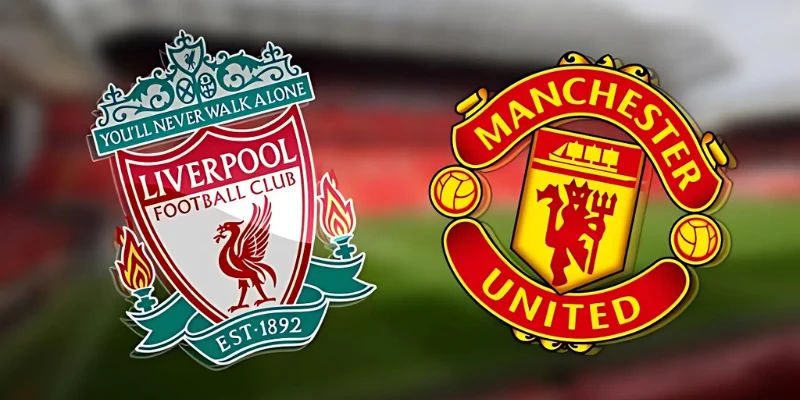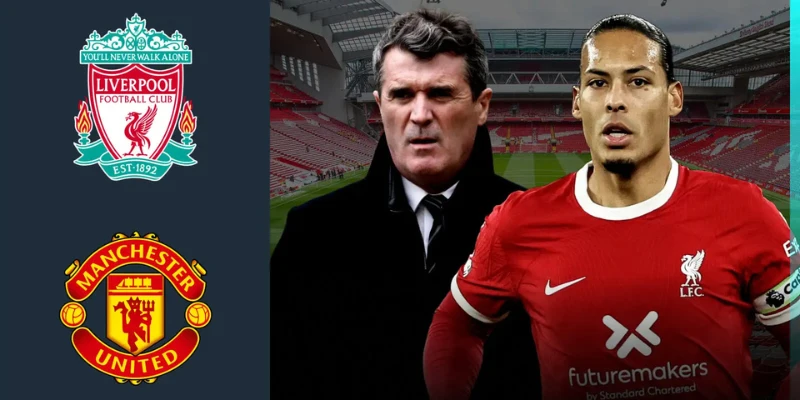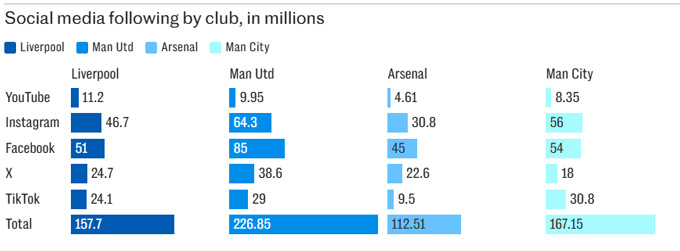Why is MU still greater than Liverpool despite fewer titles? As Arne Slot’s Liverpool just equaled their great rival MU in the number of domestic titles, Telegraph Sport calculated to determine which club is truly greater.
Liverpool is back. They now jointly hold the top spot with MU – the team that had exclusively held the throne since their 19th national championship in 2011. MU pulled two titles ahead after Sir Alex Ferguson’s final season in 2012/13, but with Jurgen Klopp’s Covid-19 title and Arne Slot’s dream debut season, the two rivals are now level: both with 20 national championships.
In times past, this might have been the sole factor in judging a club’s greatness: Show your trophies. But now it’s 2025, and we need a clearer answer.

It’s indeed very difficult to decide. There’s no doubt that MU and Liverpool are the two biggest clubs in English football history. Even so, there exists a strange antagonistic relationship between them – one rises whenever the other declines. Dalglish followed Robson, then Barnes, then Cantona, and so it went on.
The allure of the legends on the coaching bench is also symmetrical: For every Busby, there’s a Shankly, a Sir Alex will always be accompanied by a Klopp. Therefore, a deeper analysis is needed. Telegraph has divided it into 6 categories with different weightings to determine who the truly greater team is. Each team will be scored out of 40, with the first two categories having the highest weighting.
>> Sports Jilibet – JILIBET Casino
1. Titles
A somewhat “crude” but clearly very important measure in assessing a club’s size. However, the calculation also depends on which titles are counted.
Last week, upon winning the championship, Liverpool’s website recorded “51 major men’s football trophies”. This included 4 European Super Cups. They even listed 18 Reserve League First Division titles along with the legendary 1892/93 Lancashire League championship. But of course, these are not included in the official 51.
On the other side, MU’s website mixes the achievements of the men’s and women’s teams (with 3 titles), as well as listing 11 FA Youth Cup wins. Clearly, the data needs to be filtered.
Therefore, Telegraph uses the following scoring system:
- Champions League (or European Cup): 5 points
- First Division/Premier League: 4 points
- FA Cup: 3 points
- League Cup and Europa League: 2 points
- European Cup Winners’ Cup: 1 point
- Community Shield and European Super Cup: not counted
- Second Division Championship: not counted
- World Championship (FIFA Club World Cup or Intercontinental Cup): 1 point
Based on this system, Liverpool has an initial advantage. MU would need at least 2 Premier League titles and 1 League Cup to equalize, or 2 Champions Leagues, or 3 Europa Leagues, 1 FA Cup, and 1 FIFA Club World Cup.
Scores
- Liverpool: 10/10
- MU: 9/10
>> Jilibet | jilibet.com | The Premier Online Casino in the Philippines
2. Traditional Fanbase
Both clubs have average match attendances that almost fill their stadiums. Note that despite a terrible season, Old Trafford is still packed (74,879 capacity). Liverpool, despite playing better, also has no trouble filling the expanded Anfield with 61,276 seats.
The last time Liverpool had a higher average attendance than MU was in the 1992/93 season – when Old Trafford was being redeveloped. During Liverpool’s peak in the 1980s, Anfield occasionally didn’t sell out – remember the gloomy economic situation of the city at that time.
What about MU? When relegated in the 1974/75 season, they still maintained an average of over 45,000 people – the highest in the country. When Liverpool were relegated in 1954/55, their average attendance dropped by nearly 5,000.
For MU, every time the attendance drops below 60,000 is headline news. For example, the match against Astana in the 2019 Europa League: “only” 50,783 people came to watch – the lowest in 7 years.

Scores
- Liverpool: 8/10
- MU: 10/10
3. Unique Achievements
This is a more subjective category, so there are only a maximum of 5 points.
When you are a team accustomed to winning, it’s important that those victories are “special”. For example: Arsenal with their invincible season, Man City with their domestic treble, Chelsea being the first London team to win the Champions League.
Between the two teams, it’s hard to decide who had the greater comeback in a Champions League final: Istanbul 2005 or Nou Camp 1999. Both have memorable trebles: MU was the first team to win the Premier League, FA Cup, and Champions League simultaneously in 1999. Liverpool almost did the same with the European Cup, League Cup, and national championship in 1984 under Joe Fagan.
Liverpool has 6 European Cups – a record difficult to break, or a 68-game unbeaten home run under Klopp. Meanwhile, MU brought the first European Cup to English football in 1968, and their revival after the Munich disaster. Pretty even, isn’t it?
Scores
- Liverpool: 5/5
- MU: 5/5
4. Modern Fanbase
You can scoff, but social media following is now a fair measure of a club’s size, and even predicts future influence.
MU far surpasses Liverpool with over 69 million global followers. Notably, Man City also surpasses Liverpool – all three teams are far ahead of Arsenal.
Although MU’s slogan “Hated. Adored. Never Ignored.” sounds somewhat “provincial”, they are still the clear winner in this category.

Scores
- Liverpool: 3/5
- MU: 5/5
5. Identity and Cultural Influence
A great club is always associated with a unique identity. Barca represents Catalonia; Real Madrid is a symbol of Champions League victories even when they don’t play particularly well.
Liverpool has a unique character that many smaller clubs want to emulate: their distinctiveness, glories intertwined with tragedies. Despite controversial marketing campaigns (like the slogan “This means more”), no one denies the power of “You’ll Never Walk Alone” or the legacy of the “Boot Room”.
MU is like Bayern Munich – brand and scale are almost inseparable. They are a “giant” that sucks everything into their orbit, from expensive strikers to… hair product sponsors.
Liverpool seems to have a clearer identity, but MU’s enormous scale makes them hard to define – because the Red Devils are everything to every fan. And don’t forget: MU once had a song that reached number 1 on the UK charts (Come On You Reds – 1994), while Liverpool’s Anfield Rap only peaked at number 3 in 1988.
Neck and neck.
Scores
- Liverpool: 5/5
- MU: 5/5
>> Read more: Double Chance Betting – Win Betting Secrets for Newbies
6. Periods of Decline
Nothing is permanent in football. Both MU and Liverpool have experienced periods of decline after their golden eras, which reduced their status and hindered attracting new fans.
Liverpool waited 30 years for their national championship to return (1990-2020), but they still won 2 European Cups, narrowly missed out on the title several times, and had a “strange” treble in 2001. Despite a few low points (losing the 1996 FA Cup final, Gerrard’s slip in 2014, the Roy Hodgson era), it wasn’t a prolonged slump.
MU between the Busby and Ferguson eras only won 3 FA Cups, and were even relegated. They are now in another cycle of decline, despite still winning 2 FA Cups, 2 League Cups, and 1 Europa League under Jose Mourinho. This season, even avoiding relegation is considered an “achievement” for the Red Devils.
Scores
- Liverpool: 5/5
- MU: 4/5
Conclusion – MU Still Greater Than Liverpool Despite Fewer Titles?
It might seem “wrong” to underestimate the team that just won the 2024/25 Premier League and moved ahead in the overall title count. It might also seem absurd to consider the current MU the winner in any debate.
But you can’t argue with… “pseudo-science”. A narrow victory for MU.
Overall Scores
- Liverpool: 36/40
- MU: 38/40

Launched in 2017, JILIBET began its odyssey, serving the Philippines entertainment and gambling. JULIET is a Filipino-owned corporation – Ms.Carmen Dela Rosa, the CEO of Jilibet Casino, is a visionary leader who has been instrumental in driving the brand’s growth since its founding.
